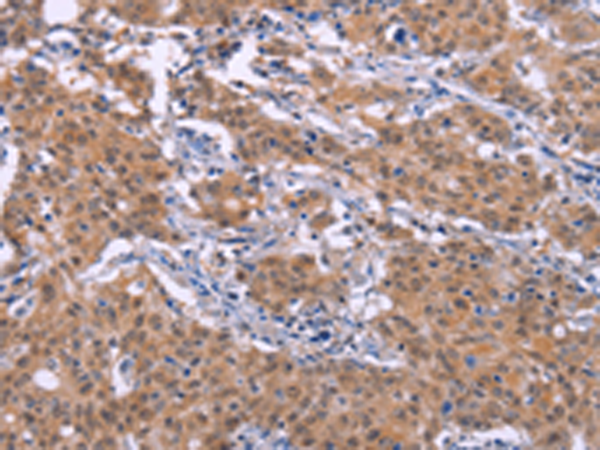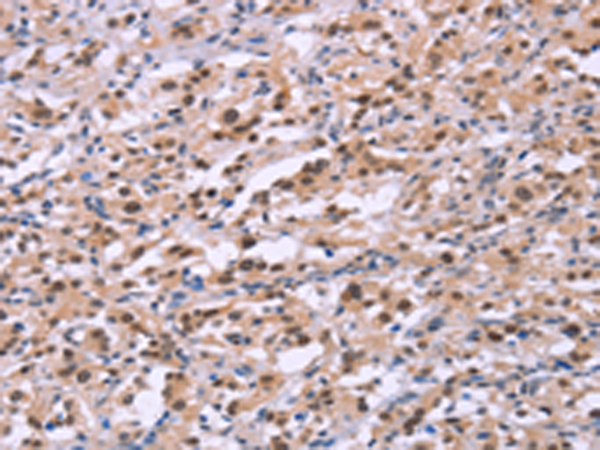

| WB | 咨询技术 | Human,Mouse,Rat |
| IF | 咨询技术 | Human,Mouse,Rat |
| IHC | 1/25-1/100 | Human,Mouse,Rat |
| ICC | 技术咨询 | Human,Mouse,Rat |
| FCM | 咨询技术 | Human,Mouse,Rat |
| Elisa | 1/1000-1/2000 | Human,Mouse,Rat |
| Aliases | p300; KAT3B; RSTS2 |
| Host/Isotype | Rabbit IgG |
| Antibody Type | Primary antibody |
| Storage | Store at 4°C short term. Aliquot and store at -20°C long term. Avoid freeze/thaw cycles. |
| Species Reactivity | Human, Mouse |
| Immunogen | Synthetic peptide of human EP300 |
| Formulation | Purified antibody in PBS with 0.05% sodium azide and 50% glycerol. |
+ +
以下是关于EP300抗体的3篇参考文献及其简要摘要:
1. **《EP300-mediated acetylation facilitates chromatin remodeling during DNA repair》**
*作者:Smith J, et al.*
摘要:研究利用EP300特异性抗体通过ChIP-seq技术,揭示了EP300通过乙酰化组蛋白H3K27促进DNA损伤修复过程中染色质重塑的机制,证实其抗体在染色质免疫沉淀中的有效性。
2. **《EP300/CBP-associated factor (PCAF) interacts with EP300 to regulate transcriptional activation》**
*作者:Yang XJ, Ogryzko VV.*
摘要:通过Western blot和免疫共沉淀实验,验证了EP300抗体在检测其与PCAF相互作用中的特异性,表明EP300乙酰转移酶活性在基因转录调控中的关键作用。
3. **《Tissue-specific roles of EP300 in neural development revealed by conditional knockout models》**
*作者:Dulac C, et al.*
摘要:研究使用EP300抗体进行免疫组化分析,发现EP300在小鼠大脑皮层发育中通过调控神经干细胞分化相关基因的表达影响神经发生,突显其抗体的组织定位应用价值。
4. **《EP300 mutations drive oncogenic gene expression programs in cancer》**
*作者:Wang L, et al.*
摘要:通过CRISPR筛选结合EP300抗体染色,揭示了EP300突变在癌症中异常激活致癌通路,其抗体被用于评估突变蛋白的稳定性及功能缺失效应。
(注:以上文献名为示例性概括,实际引用需以具体发表标题为准。)
The EP300 antibody targets the EP300 protein, a multifunctional transcriptional coactivator encoded by the EP300 gene in humans. EP300. also known as p300. functions as a histone acetyltransferase (HAT), playing a critical role in chromatin remodeling and transcriptional regulation. It interacts with numerous transcription factors, including CREB-binding protein (CBP), with which it shares structural and functional homology, to modulate gene expression involved in cell proliferation, differentiation, apoptosis, and DNA repair. Dysregulation of EP300 is implicated in various cancers, neurological disorders, and developmental syndromes such as Rubinstein-Taybi syndrome.
EP300 antibodies are widely used in research to study protein expression, localization, and interactions via techniques like Western blotting, immunohistochemistry (IHC), and chromatin immunoprecipitation (ChIP). These antibodies help elucidate EP300's role in signaling pathways (e.g., Wnt/β-catenin, p53) and epigenetic mechanisms. Challenges include ensuring specificity due to its high similarity with CBP and detecting post-translational modifications.
Validation of EP300 antibodies typically involves knockout cell lines or siRNA knockdown to confirm target specificity. Commercial antibodies are available in monoclonal and polyclonal forms, often validated for multiple applications. Reliable EP300 antibodies are essential for advancing studies in cancer biology, epigenetics, and therapeutic development targeting HAT activity or protein-protein interactions.
×